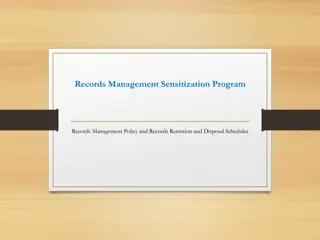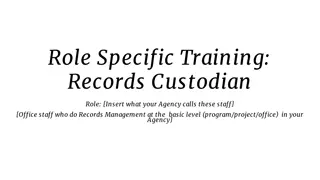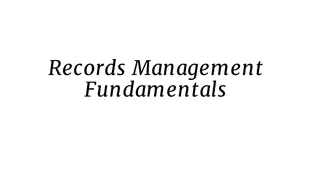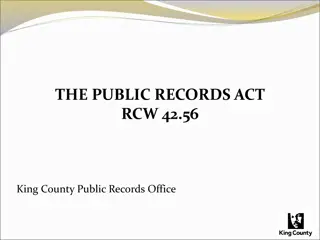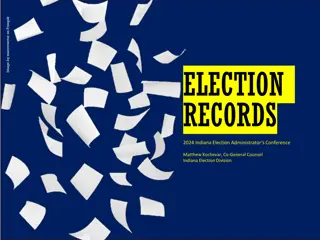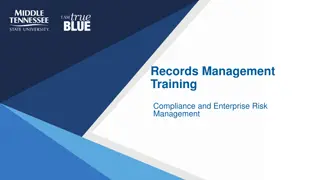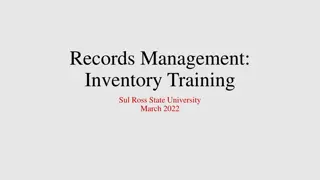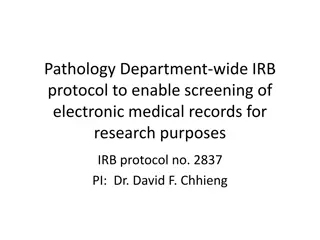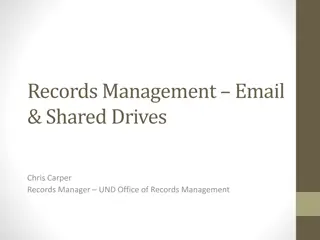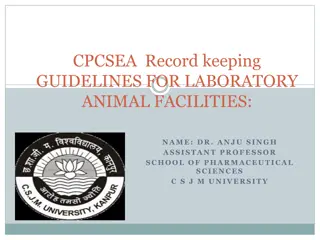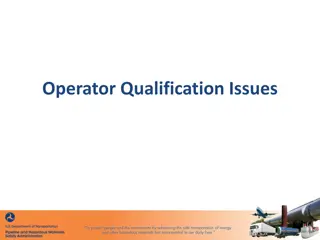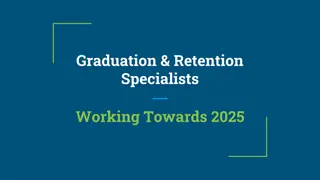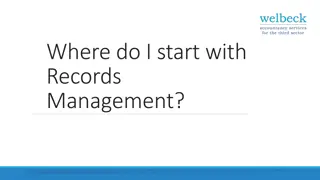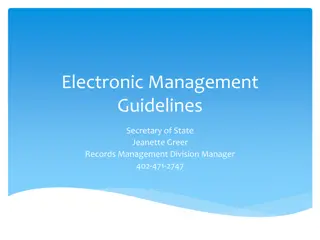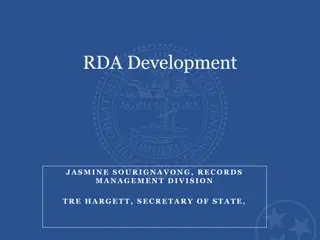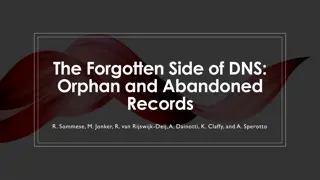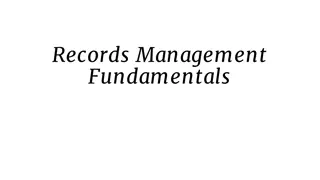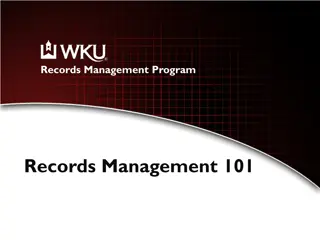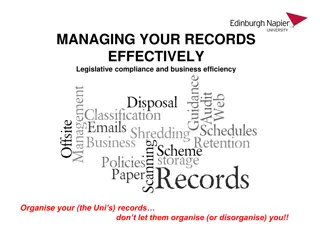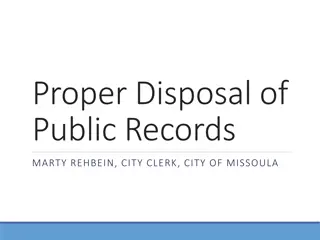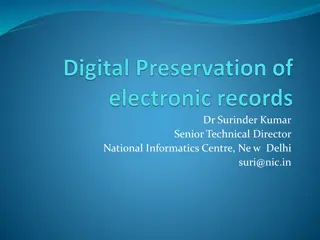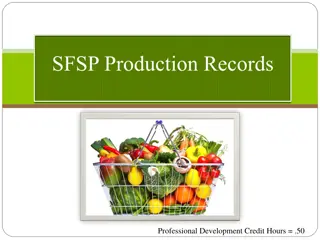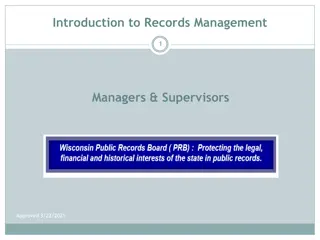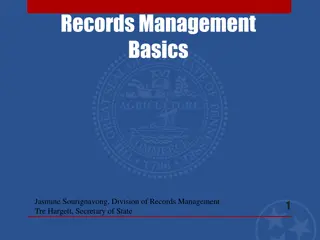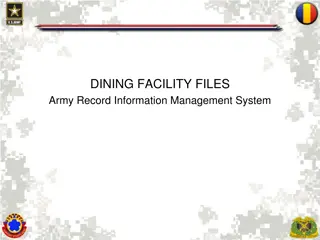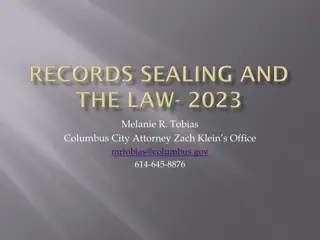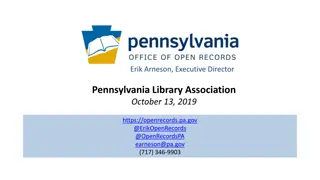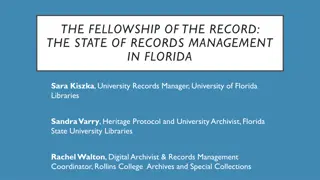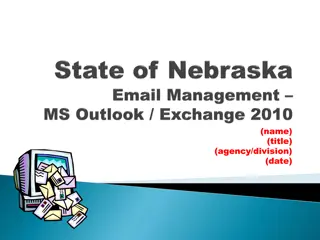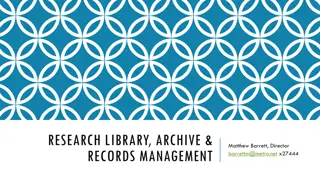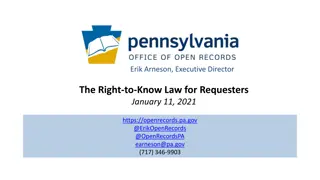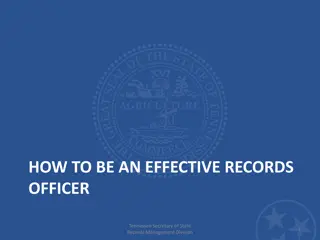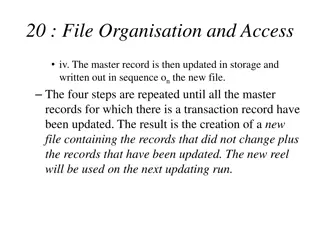NARA’s Regulation for Digitizing Permanent Records
NARA has issued regulations and guidance for digitizing permanent records, including the disposal of original analog records, with the aim of enhancing efficiency and accessibility. The process includes reviewing and updating regulations periodically, transferring metadata when records are transferr
1 views • 20 slides
Methods for Extending Streamflow Records and Their Importance
The presentation outlines methods for extending streamflow records, the reasons behind doing so, and the process of using the results. It includes examples of using data from long-term sites to estimate records at short-term sites. The importance of extending records is highlighted, emphasizing the
1 views • 48 slides
Comprehensive Records Management Guidelines for COMESA Secretariat
Explore essential aspects of records management for COMESA Secretariat, including sensitization programs, records retention policies, valuable records identification, information sensitivity classification, and vital records preservation. Learn about the importance of maintaining records with admini
7 views • 9 slides
Role-based Training for Records Custodians
Role-based training slides for Records Custodians at your Agency, focusing on managing records at the office level and implementing records management policies and procedures, including applying retention schedules, understanding RM staff structure and policy, coordinating with Records Liaisons, and
0 views • 8 slides
Understanding Records Management Fundamentals for Federal Agencies
This training course outlines the essential responsibilities and procedures for managing federal records. Discover the importance of records management, how to identify federal records, and key resources to support effective records management practices within your agency.
2 views • 63 slides
Understanding the Public Records Act in King County
The Public Records Act in King County emphasizes the people's sovereignty and their right to access governmental records. It defines public records, explains the meaning of writing, and lists various types of records. The content also covers the format of requests and the legal obligations of agenci
1 views • 21 slides
Public Records Regulations in Indiana Elections
Indiana's public records laws dictate that most agency records, including election materials, are publicly accessible. However, certain voter registration and election records have exemptions. The rules cover the availability of records related to voter registration, election administration, and pos
0 views • 12 slides
Comprehensive Records Management Training Program
Dive into the world of records management with a detailed training program covering compliance, enterprise risk management, database usage, state agency requirements, coordinator responsibilities, terminology, and more. Understand the importance of maintaining internal records management programs an
1 views • 33 slides
Enhancing Driver Health and Retention Strategies in the Transportation Industry
Explore the critical importance of prioritizing driver health and retention to address challenges like driver shortage, retention, compensation, and lawsuit reform in the transportation sector. Learn how focusing on driver well-being impacts various departments and discover top driver health conditi
0 views • 10 slides
Hope Student Retention & Persistence Analysis Overview
Analysis conducted by the Frost Center at Hope College on student retention and persistence, focusing on demographic variables and involvement in various activities. The retention rates by cohort and class year are outlined, along with explanations on retention calculations and measurements. The dat
0 views • 29 slides
Effective Records Inventory Management Training at Sul Ross State University
This content presents an overview of records inventory training conducted at Sul Ross State University in March 2022. It covers the importance of records inventory, benefits, step-by-step guidance, identification of non-records, and cataloging procedures for individual and departmental records. The
1 views • 9 slides
Role-Based Training for Records Liaisons
Utilize these slides to develop role-based training for Records Liaisons at your agency, as defined by NARA. Customize the content to suit your agency's specific needs in records management. No approval is required from NARA for customization. The training covers the responsibilities of Records Liai
1 views • 7 slides
Pathology Department IRB Protocol for Electronic Medical Records Screening
Pathology Department's IRB protocol enables the screening of electronic medical records for research purposes, allowing members to review patient records and pathology slides. By fulfilling specific requirements and obtaining blanket IRB approval, researchers can access and analyze patient data for
0 views • 16 slides
Comprehensive Guide to Records Management at UND
Explore the essential aspects of records management at the University of North Dakota (UND), including records retention policy, lifecycle, definition of records, and mediums. Learn about the main objective of the Records Management department, records criteria, what constitutes a record, and what i
0 views • 26 slides
Understanding the Process of Sealing Criminal Records
Sealing criminal records means restricting public access to the records, although they are not destroyed and remain accessible to certain entities. Eligibility requirements vary, and action must be taken to seal records. This presentation covers the process, eligibility criteria, and what to expect
1 views • 36 slides
Guidelines for Recording Keeping in Laboratory Animal Facilities
The Committee for the Purpose of Control and Supervision of Experiments on Animals outlines the importance of maintaining detailed records in laboratory animal facilities to ensure the well-being and proper management of animals used in experiments. Records ranging from animal house plans, staff hea
4 views • 5 slides
Overview of Operator Qualification Issues and Recordkeeping Requirements
This collection of images provides insights into operator qualification issues, the importance of OQ, span of control, OQ testing content and methods, critical and missed questions, test failures, evaluation methods like discussions, simulations as a qualification tool, disqualifications, abnormal o
0 views • 14 slides
Enhancing Student Success: Graduation & Retention Strategies for 2025
Newly created Graduation Retention Specialists (GRS) play a crucial role in supporting the goals of GI 2025 by implementing targeted campaigns and proactive advising. Initiatives like Freshman Cohort Retention and focusing on completing the Golden Four aim to increase student retention rates and fou
0 views • 16 slides
Getting Started with Records Management
Records management is a licensed work under the Creative Commons Attribution-NonCommercial-ShareAlike 4.0 International License. It involves understanding the definitions, purposes, stages, policies, procedures, and tools related to managing records effectively. This comprehensive regime encompasses
1 views • 40 slides
Best Practices for Electronic Records Management
Electronic records management guidelines outlined by Secretary of State Jeanette Greer emphasize the importance of retaining and managing electronic records effectively. Understanding the definition of records, handling cluttered records retention, and managing electronic records properly are crucia
1 views • 19 slides
Efficient Records Management Practices and Procedures
Learn about Records Disposition Authorizations, Statewide RDA, Specific RDA, Retention Schedules, and the Benefits of a Retention Schedule in ensuring compliance with laws, protecting records, and reducing costs. Discover the steps to create, revise, or delete an RDA via the web app provided.
0 views • 35 slides
The Forgotten Side of DNS: Orphan and Abandoned Records
DNS zone administration can be complex, leading to misconfigurations like orphan and abandoned records. Orphan records are former glue records no longer needed, while abandoned records have related domains but are unnecessary. This analysis extends prior research, examining 2K TLDs over 25 months to
0 views • 19 slides
Enhancing Patient-Centered Care Through Improved CMC Records at The Hillingdon Hospitals NHS Foundation Trust
The Hillingdon Hospitals Trust aims to enhance patient-centered care by improving visibility and awareness of CMC (Coordinate My Care) records across generic teams through the development of specific patient information resources, tracking patient attendance at ED with CMC records, and optimizing th
0 views • 11 slides
Records Management Fundamentals Training Overview
This overview provides insights into a training course on Records Management Fundamentals, designed to educate Agency staff on their responsibilities in managing Federal records. It covers the importance of records management, identification of federal records, fundamental management principles, and
0 views • 63 slides
Effective Records Management Program Overview
Explore the comprehensive Records Management Program at Kentucky State University, covering the creation, maintenance, preservation, and destruction of records. Learn about public records, retention guidelines, record models, and schedules for various university departments. Understand the importanc
0 views • 14 slides
Efficient Records Management for Legislative Compliance and Business Efficiency
Learn how to effectively manage your records to ensure legislative compliance and enhance business efficiency. Discover the importance of aligning records management with strategic objectives and university values. Empower yourself with the knowledge and skills to organize records systematically whi
0 views • 37 slides
Proper Disposal of Public Records Guidelines in Montana
Guidelines for proper management and disposal of public records in local government entities in Montana, outlined under HB 123 passed in 2015. The Local Government Records Committee (LGRC) oversees records retention schedules and reviews disposal requests. Contact LGRC for questions or assistance re
0 views • 24 slides
Challenges and Importance of Electronic Records Preservation
The proliferation of digital data poses challenges in preserving electronic records due to rapid technological changes and digital obsolescence. Obsolescence of file formats, storage media, software, and vendor lock-in threaten the integrity and accessibility of e-records. Legislation mandates the r
0 views • 30 slides
Understanding Production Records for Menu Planning in Food Service
This presentation provides valuable insights into the importance of maintaining accurate production records in food service to ensure compliance with meal pattern requirements. It covers topics such as the purpose of production records, who should be involved, where to keep the records, when to fill
0 views • 9 slides
Public Records Management Best Practices
Learn about public records management, including the definition of public records, the importance of records management, the life cycle of a record, why public records management is essential, and your responsibilities in managing public records effectively.
0 views • 19 slides
Understanding Records Management Basics and Regulations
Learn about records management fundamentals, the role of the Public Records Commission, definitions of records, and types of records regardless of format. Understand the importance of managing records properly and the regulations governing access to confidential records.
0 views • 12 slides
Efficient Management of Dining Facility Records with ARIMS Guidelines
This content provides detailed information on the Army Record Information Management System (ARIMS) and its application in managing records at dining facilities. It covers areas such as ARIMS principles, filing guidance, labeling, and disposition of records. Understanding ARIMS helps dining facility
0 views • 22 slides
Understanding Records Sealing and Expungement in Ohio
Records sealing and expungement in Ohio are processes that allow individuals to have their criminal records either sealed from public view or completely destroyed. These acts are privileges, not rights, and applicants must meet specific criteria to be eligible. Expungement involves the physical dest
0 views • 21 slides
Understanding the Pennsylvania Right-to-Know Law
The Pennsylvania Right-to-Know Law (RTKL) governs access to state and local government records. This law ensures transparency by allowing individuals to request and access records created or held by agencies. The process involves submitting a request, agency response, possible appeal to the Office o
0 views • 24 slides
Challenges and Strategies in Records Management: Insights from Florida Institutions
Explore the state of records management in Florida through insights shared by records professionals from various universities. Discover the expertise levels required, collaboration with Records Management Liaison Officers, interactions with records creators, record transfer processes, outreach initi
0 views • 12 slides
Effective Email Management and Records Retention Guidelines
This document provides guidelines for effective email management and records retention, emphasizing the importance of classification, storage, and disposition in accordance with business, legal, historical, and financial requirements. It highlights the need for users to apply retention policies/tags
0 views • 22 slides
Effective Records Management Best Practices in Organizational Settings
Explore best practices in records management for organizations, covering topics like digital document quality control, metadata issues, email retention policies, and storage systems. Learn how to maintain data integrity and compliance with retention schedules for various types of records.
1 views • 9 slides
Understanding Right-to-Know Law Basics
The Right-to-Know Law establishes the process for requesting records from state and local agencies. Requesters must seek records, not ask questions, and agencies can grant, deny, or partially fulfill requests. Appeals can be made to the Office of Open Records (OOR) and potentially to court. Records
0 views • 58 slides
Effective Records Officer Guidelines by Tennessee Secretary of State
Learn the essential skills and responsibilities required to be an effective Records Officer/Coordinator in Tennessee as outlined by the Secretary of State Records Management Division. Communication, organization, leadership, collaboration, critical thinking, and decision-making are crucial aspects f
0 views • 17 slides
Sequential File Maintenance and Organisation Process
In sequential file maintenance, the master records are updated and written to a new file in sequence after processing transaction records. This process continues until all relevant master records are updated, resulting in a new file with unchanged and updated records. Additional steps involve file s
0 views • 7 slides


